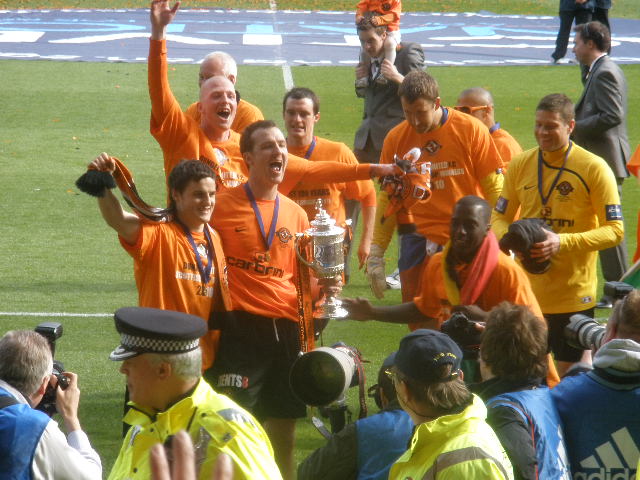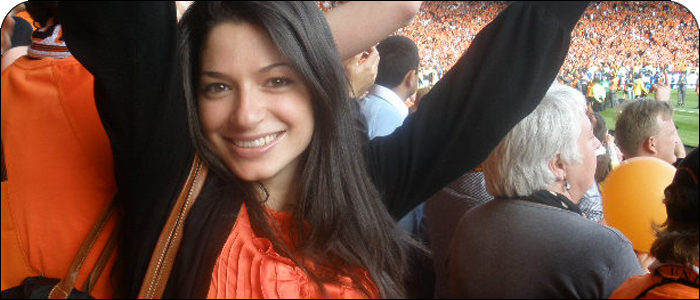
Fitba
Welcome to pages of obsession, for like many Scots I am thirled to the national game of football and fascinated by our seminal role in the creation of the beautiful game played around the globe today. My teams are Dundee United and Scotland, but being married to a Portuguesa members of my family have the good fortune to turn their attentions to Benfica and Portugal when things get tough for the home teams, which they frequently do! As long as Scotland and Portugal avoid each other in international competition, everything works fine. As you can see here from the scenes at Hampden when United won the Scottish Cup in May 2010, fitba can create memorably joyous occasions and that was a wonderful day out for all of us.
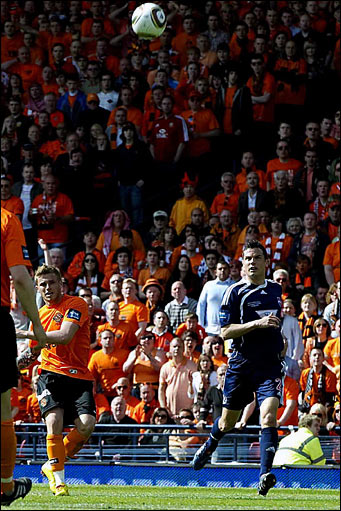
The Moment of Truth: The ball on the way to the net for Goodwillie's amazing first goal in the Cup Final - just above his head all of the Kay party look on in anticipation.
Apart from United lifting the Cup regularly and returning to their European glory days, my main football wish is to see Scotland qualify again for the finals of the European Championship and the World Cup. Having supported the boys in blue at the finals in Germany, Spain and Mexico and knowing what a great time you have as part of the Tartan Army abroad, I want Joanna, Catriona and Euan and all Scots of that generation to experience it themselves. An it gaes wioot saying, I want them tae tak their faither alang wi thaim, nae maitter how auld he is!
Here are a few of my Mundial Memories:
GERMANY 1974
I was at Hampden when Jordan's diving header went in against the Czechs - I'm gaun, I'm definitely gaun, I thought, and I've been gone ever since.
It began in the Boy Scout shop in Forest Road Edinburgh. I had been celebrating manically the end of my finals at Edinburgh University, and staggered into the shop to buy a wee Scottish flag for my rucksack - to help the hitch hiking along. When I asked the assistant, she apologised, and unfurling a huge six foot saltire, said "This is all we have". I was transfixed. My battle standard was born, and it served me well as stylish cape, rainmate, shawl and flag on illustrious campaigns such as Anfield, Frankfurt, Queretaro and Seville.
As one of the few German-speakers in the tartan army, my main memory of the 1974 world cup is of chatting up women - for other members of the Tartan Army. "Tell her Ah love hur!...tell her Ah'll flee her back tae Glesga...tell her onythin!" were some of the lines I had to translate. The astonishing thing is that they often worked.One supporter who had no need of my services was the Man wi the Plastic Bag. All he had to his name was a t shirt, a pair of shorts, a plastic bag to sleep in and an exquisite line in Glasgow patter which got him fed and watered by the fans throughout the tournament. I run into him in Frankfurt station after the Yugoslavia match, presuming he was part of the huge retreat home. "Naw", said he, "Me an some o ra boays is awa doun tae Greece for a couple a month, but in the meantime...see that burd ower ther (indicating a beautifully groomed young lady)..she's a Norwegian air stewardess an I'm steyin here wi her a few days. This is the gemme, eh?
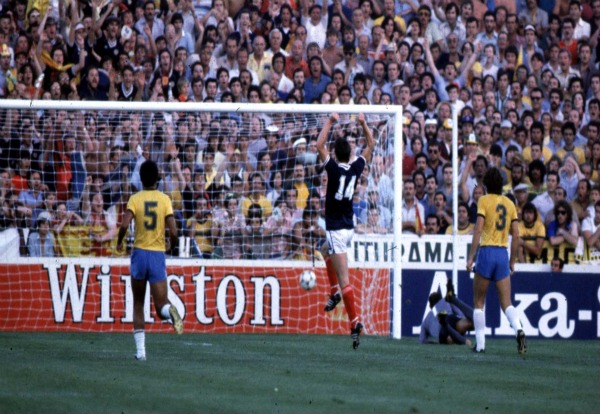 David Narey's goal against Brazil in Seville I am one of the crowd going mental immediately behind the goal I swear that I heard the swish of the ball hitting the net before the crowd erupted!
David Narey's goal against Brazil in Seville I am one of the crowd going mental immediately behind the goal I swear that I heard the swish of the ball hitting the net before the crowd erupted!
SPAIN 1982
Having by now married a Portuguese girl, I was again one of the few members of the tartan army who could communicate with the Brazilian fans in their own tongue. The taverns of Seville were a welter of samba rhythms from the batuk drums, pipe reels, and flamenco dancing. There, the Scots held their own, but in the stadium it was the insistant rhythms of the drums which dominated the atmosphere and dictated the rhythm of play. Narey's goal was a counterpoint. I was so close, I heard the swish of the net as the ball hit it...there followed a second of stunned silence then all hell was let loose. But it was only counterpoint, the brazilian rhythm was soon re-established and we were well beaten. I was there with Willie McIlvanney, Gordon Brown and Bill Campbell (of Mainstream Publishing), so at least there was the consolation of an attempt at intelligent analysis after the game. Eventually though we gied up and had a greit intae oor drinks like aa body else.
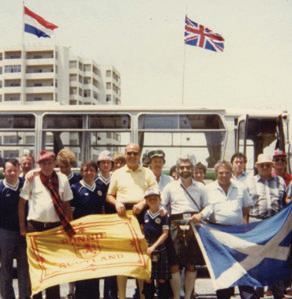
Billy and a section of the Tartan Army about to board the bus from Malaga to Seville. Among them are novellist Willie McIlvanney on the left and future Prime Minister Gordon Brown two over on the right.
MEXICO 1986
"Scotland, Scotland, we walked a million miles for wan o yer goals, o Scotland" Yes it was a long way to go for one goal, but the humour of the Scots fans and the warmth of our Mexican hosts softened the usual on field disappointment. The fans were brilliant. We had been warned in advance about the sprawling slum surounding the stadium in Mexico city, but the warnings were ignored as the Scots and Mexicans partied together. You would look up dirt alleys, and there was a group of Scots drinking and singing with the Mexicans, enthusing to each other. I usually go into the huff for a while after a defeat, so the German win in Queretaro rendered me (as Dundonians say) pussy seik. But an hour later a group of us found ourselves at a traditional Rodeo, complete with cowboys, cowgirls and a mariachi band in the stand. During the performance an Aberdonian behind us confessed "he hadna a clue fit wes gaun on, but it duisna maitter". He was right. Even in defeat, the usual mood of affability and outgoing warmth reasserted itself, and the Mexicans and Scots probably for the first and last time in the history of the rodeo, ended up dancing the afternoon away to the trumpets of the Mariachi band. Viva Mexico! Viva Escocia! Viva o Mundial!

Liverpool's line up 1892 the team had at least ten Scots and they were nicknamed the Macs. (Images courtesy of the Scottish Football Museum, Hampden Park)
The following is adapted from a longer chapter in my book The Scottish World:
IT WES US
When England supporters at the World Cup in South Africa sang about football and the trophy itself "coming home" apart from being scunnered by their cheek, we Scots knew in our hearts that it just wesnae true it wes us that taught the world tae kick a baw, so if football ever had a homeland to come home to it had to be Scotland! The problem was that most of us had little knowledge or evidence to back up the claim. Meanwhile with words like Inglés, Anglais, Anglichanin used in most parts of the globe to describe British pioneers of football in their country, the great propaganda machine of English football is delighted to re-patriate these pioneers, translate Inglés as English and claim arrogantly that it was Englishmen who took the game round the world.As I proved in my radio series "It Wes Us", nothing could be further from the truth for there is compelling evidence to back the claim of Scotland as the home of the world's greatest game.
My own interest was kindled a few years ago, when I spoke to Lennart Persson of Gothenburg University on the huge Scottish influence in every area of life in that part of Sweden. He described how the first ever game of association football played in the city had one team made up of Scottish workers from a curtain factory near the Orgryte sports club. The victories of the Scots over a Swedish/English select at that time were not unexpected, but when I got home the reference to the curtain factory made me turn to one of the books on my native Irvine Valley, and there in "A Pictorial History of Newmilns" by Jim Mair was the astonishing answer the urtain factory in question had been owned by Johnston, Shields & Co of Newmilns who also owned another factory abroad, La Escocesa in Barcelona and there they were lined up as Escoces FC. for the team photo at Bonanova in 1899. It even claimed that they had won the Spanish cup the first time it was contested! For once I had some evidence for my football fantasy of Caledonian hegemony in the origins of the beautiful game. It wes obviously Ayrshire boays that taught the world tae kick a baw!
As in Barcelona and Gothenburg, the English and the Scots were in at the beginning of football in many cities such as Paris with Gordon FC representing the Scots, and White Rovers, the English. Similarly In Montevideo, old rivalries were maintained with early football matches between ex-patriate Englishmen from the Cricket Club and ex-patriate Scots from a Rowing Club team hoatching with name like Harley, McKinnon, McCall, Walker and McEachen! Now I am happy to concede that given their numerical advantage, in many places it was the English who planted the roots of the game. I would also accept that it was the basic rules laid down by the FA in 1863 which codified soccer and created the conditions for expansion. But the game that developed in England and was planted in far flung places by Englishmen abroad in the decades following 1863 was a kick and rush, leader of the pack type game where you dribbled till you lost the ball. Meanwhile in Scotland from 1867 onwards, teams like Queens Park were evolving a scientific, short-passing style that became recognised as the characteristic Scottish way of playing the game.recognised in the international football section on FIFA's website:
"it was Scotland's revolutionary passing tactics that proved the more effective. and the country north of the border went on to claim eight victories in the first 12 England-Scotland encounters."
The English dribbling style which had been formed in the close confines of the playing areas of English public schools indeed was so inferior to the Scottish game that the Scots built up such a lead in internationals with the Auld Enemy that it took the bigger country with over ten times the population another hundred years to catch up! You then have professionalism coming into the clubs in the north of England, and the beginning of the Scotch Professors, the creative half backs and inside forwards establishing the Scots game there and dominating the league from its inception. Some teams like Liverpool and Bolton Wanderers played with a token Englishman and up to ten Scots, but Blackburn, Sunderland, and Newcastle, all the early giants of English football, regularly played with an average of 7 Scots in the team. With Scots domination of the leagues, and regular English humiliation in the international fixtures, eventually, even the last of the "amateur toff" teams, Corinthians founded in 1883 by AL Jackson, were adopting the Scottish passing style which had swept England and would now sweep the world. An English commentator in 1888 acknowledged the growing supremacy of the Scottish style."we may fairly say that there have been two ages of the Association play, the dribbling and the passing" To have had such a major impact so quickly, it would be my contention that the passing game must have been established as the national style for years before our footballing lads o pairts began to take their skills over the border and on to the rest of the world in this late Victorian era. Our obsession with football after all goes back at least as far as the 15th century when the Scots Parliament was so concerned about us practicing keepy uppie rather than weaponry that it issued this proclamation in 1457
"It is decretyt an ordanit that wapinschawings be haldin fower times in the yere.an the fitba an the gowff be utterly cryit doun an nocht usit" [wapinschaw: muster of arms]
That wes thaim tellt! Some hope. The obsession just got stronger and reached its zenith at the turn of the 20th century.
In my own Irvine Valley, local legends such as the three brothers Steel from Newmilns playing with Spurs in the 1910/1911 season, or five senior footballers from one single street in Darvel, testify to a phenomenal explosion of footballing talent released onto the world's burgeoning football market from the Scottish Lowlands. It was this new breed of Scottish professional footballers who transformed the game wherever they went. In South America e.g. British workers, railway engineers and sailors undoubtedly played the game indeed it is the son of a Scots railway engineer Charles Miller from São Paulo, who is credited with introducing football to Brazil in 1894 but his football was learned at school in Hampshire before the Scots game put down roots in that part of England. It is after 1900 that the Scottish style arrives with Jock Hamilton imported as the first professional coach in the country, and Archie McLean and his wonderfully named Scottish Wanderers showing the Brazilians how soccer was played back in Paisley! In São Paulo, when McLean arrived, the kick and rush game was still extant, and he recalled later that he had to put a stop to the attitude that the best player was the one who could kick furthest and highest! With his fleetness of foot on the wing, McLean got the nickname o viadinho - Little Deer, and along with Bill Hopkins at inside forward for the Wanderers, he established the high speed short passing game in the city, and up to the level of the State Selection for McLean played in the Paulista select that was a forerunner of the Brazilian national team. Brazilians recognised the new scientific game established by Mclean, but as in so many instances it's Scottish roots are lost and it is referred to nowadays as systema inglês - the English system!
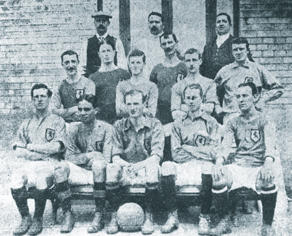
The Scottish Wanderers, São Paulo c 1912. Archie McLean is on the right of the front row.
Audio Click to hear a clip about Brazil from Billy's two part radio series It Wes Us.
However, futher South, the role of Scots professional footballers in the transformation of the world game can be shown in the career of one of the greatest Scotch Professors, John Harley. When Harley arrives in Montevideo, the Uruguyans are mesmerised by the man's skills and recognise immediately that the older English style has given way to something vibrant and different "HARLEY CAMBIA LA FORMA DE JUGAR" Harley changes the way we play, screams the heading in 100 Years of Glory - The History of Uruguyan Football..."[he was] the first foreigner to transform the Uruguyan style of play. He taught us how the ball should be passed at speed along the ground from front to back...and put a stop to the tradition of thumping long balls up the park" What a perfect description of the scientific game, and what an immediate effect it had, for within twenty years of Harley arriving in the country, Uruguay had won the inaugural world cup of 1930. Sadly, at a time when we actually could have contested the latter stages of the world cup finals, we bided at hame, content to have a go at England in the British championships.
In that 1930 World Cup though, we did have several players in the American team that came third, while Uruguay's opponents in the final, Argentina, owed its rise in football fortune to the efforts of the Scotsman recognised as the Father of Argentine football, Alexander Watson Hutton. He founded both the Argentinian League in 1891 and the Football Association in 1893. Originally, on his arrival in Buenos Aires in 1882, he had taught at St Andrews Scottish School in the city and began a successful team there. In fact, the very first Argentine championship of 1891, resulted in a play off between St Andrews FC and Old Caledonians FC, the St Andrews boys coming out on top against their compatriots. Hutton himself thoughwent on to open his own English High School, which had an even greater emphasis on football. As the men's game became more organised, Hutton's team of former pupils, Alumni would develop into one of the best of the country's leading clubs, winning 10 of the first 12 Argentine champion ships. The passing skills of Alumni and St Andrews players were in demand further afield the former St Andrews player, James Buchanan is described as the fist "maestro" to play for Peñarol in Uruguay. Watson Hutton organised the first international between Uruguay and Argentina in 1901, and fielded an Argentine eleven full of Alumni players.
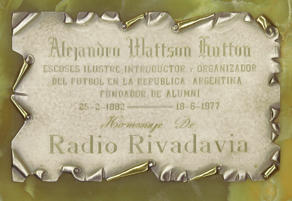
Plaque to Watson Hutton in Buenos Aires.
Audio Click to hear a clip about Argentina from Billy's two part radio series It Wes Us.
But, there was literally nowhere in the world the Scots didnae take football - in my Dundee book there's even a photo of the boys playing on the Arctic ice during a lull in a whaling expedition on another voyage in 1875 a game had to be abandoned following an attack by polar bears who ate the sealskin baw. At the other extreme,the Scots traveled hundreds of miles to play in the searing heat of the Australian outback, while in India, regiments of the British army played for the Duran Cup, the third oldest soccer tournament in the world. As with other international competitions between the Scots and the English, the Scottish regiments prevailed to such an extent that both the Highland Light Infantry and the Black Watch won the competition three times and got to keep the trophy...you can see them displayed at regimental museums in Glasgow and Perth. In Australia, Canada, South Africa and New Zealand, the Scots were at the forefront of football's advance in Canberra e.g. two Scots exile obsessions were combined with the Burns Club also becoming the principle football club. Another major conduit of Scottish football's inexorable march toward world domination was provided by the kirk. Yes, the kirk, fitba an Rabbie Burns, it sounds like a scene from the Cottar's Saturday Night "from scenes like these auld scotia's grandeur springs" The kirk's huge missionary effort of the later 19th century co-incided with the spread of association football. Boys Brigade teams e.g. existed all over Africa at one time and it was particularly strong in presbyterian colonies like Malawi, the former Nyasaland. The extent of the game's hold on the country, and the kirk's realisation of its benefits, are revealed in letters home to Edinburgh, advising that it is not worth sending out young men as missionaries unless they are prepared to take football training as well!
The extent of the Scottish diaspora occasionally raised problems for the SFA. In Shanghai, football was established as early as 1879, and John Prentice from Glasgow became president of the Engineers team in the city. They applied successfully to come under SFA jurisdiction, so there was a bit of concern among Scottish-based clubs about getting drawn away to the Shanghai Engineers in an early round of the Scottish Cup! John Prentice donated a cup for the local derby, Enginers v Shanghai, and by 1907 there was an International Cup competion open to teams made up of players from all of the soccer playing countries such as England, Germany, France and Belorussia. Because of their passing game, The competition was dominated by Scots.
We were also to the fore in Eastern and Central Europe. In 1910, an Angus flax inspector from Montrose, John S Urquart described his efforts establishing the new game first in Reval, now Tallinn in Estonia and later in the interior of Russia at a place called Sytcheffka near Smolensk. He laid the foundations of the beautiful game, but in both places he came accross one major problem: "I had considerable success teaching the Russian peasants the rudiments of football, except in one aspect. In all the time I was there I could not prevail upon one of them to head the ball"!!
Johnny Madden from Dumbarton would be bit more successful. Balancing a career as a footballer and riveter in a Clyde shipyard, Madden was in the first ever Glasgow Celtic team of 1888. But it was his arrival in Prague in 1905 which heralded an illustrious career that lasted twenty five years with Slavia Prague. There he was known affectionately as Dedek or Granpa Madden! Under his tutelage, Slavia won the Mitropa Cup, a forerunner of the major European competitions. He was also closely involved with the Czech national side at the Paris Olympics in 1924 the team full of Slavia players. Many of the Czech team who were runners up in the 1934 World Cup had trained under him. As with all great footballing legends, myths surround him as well one concerns a famous statue of him in Prague. Many people mention it, but no one has actually seen it - I think it is another Hoops myth emanating from the Celtic View!
During part of Madden's period with Slavia, the other main team in Prague, Sparta, was coached by another Scot, John Dick. It is said that Madden only learned enough Czech to slag off his players, and communicated in a mixture of German, English, Czech and Scots. I would love to have a recording of Madden and Dick's instructions from the dug out during a Slavia v Sparta derby! The man who had helped Madden land the Sparta job, Jacky Robertson of Rangers, went on to become the coach of MTK Budapest and of Rapid Vienna. Now if you think of the great Hungarian team of the 1930's and 1950's, and the Austrian Wunderteam of the 1930's, you realise the important foundations for football development laid down by these Scots. The very first soccer team in Vienna, called appropriately First Vienna, had at its core a group of Scots gardeners who looked after the Rothschild estates around the city. They still play in the Rothschild livery of blue and yellow to this day. The other great "Scottish" coach in the city was Lancashire born Jimmy Hogan. Hogan had learned his football at Fulham, a club dominated by the Scots, who taught him the game he took to the continent. In an old edition of the World Soccer Book, his entry states: "A great believer in the classical Scottish passing game, he was the tactical brains behind the famous Austrian Wunderteam of the 1930's"
Ironically, the guid conceit we had for our passing game as a nation was also part of our problem - we were so thirled to our relationship with England, that we did not see the wider picture and the need to participate in the developing world game - a world game that we had more or less created. The philosophy that prevailed was if we could continually beat the mighty English, with a tenth of the population, then we could beat anybody. Now, I agree with English historian Jim Walvin, author of The People's Game, that the Scots "were up for it" - the games against England for the Scots took on a significance way beyond sport, in fact I think "up for it" is an understatement. But historically the wee team didnae keep hammering the big team, just because they were up for it...they beat them constantly in the first hundred years of football's existence because of the superiority of the native Scottish game, its technique, its skill and yes, undoubtedly, its passion.
Quite apart from our rivalry in international matches, England remained our greatest footballing colony; the first professional footballer in the world was the Scot James Lang who played for Sheffield Wednesday; the founder of the Football League was William Mc Gregor, and the pioneer of the FA Cup was Lord Kinnaird, who broke so many records as a player in the competition that he was given the first FA cup trophy to keep! While the days of Scots players dominating the great English teams are gone, our managers continue the tradition of the Scotch Professors through to the present day with Ferguson, Moyes, Coyle and McLeish flying the flag in the top flight of the English game. The legacy of Madden, Busby, Stein and Shankly lives on!
Simply put, the Scots created the modern passing game, they converted England to it, and eventually it was our style that prevailed everywhere the game was played. In the 1986 World Cup final in Mexico, the first of Argentina's goals was scored by Jose Brown, the great grandson of one of the thousands of Scots migrants who graced South America in the 19th century. Well to paraphrase his namesake, the godfather of soul James Brown...as far as fitba's concerned "Sing it loud, we're Scots and we're proud." Playing the game, we just have to get back to our roots. Promoting our glorious, seminal role in its history, we just have to tell the world, and keep reminding the English...it wes us.
To listen to an interview Billy did on the history of Scottish footbal with John Turnbull of the Global Game website in Atlanta, Georgia.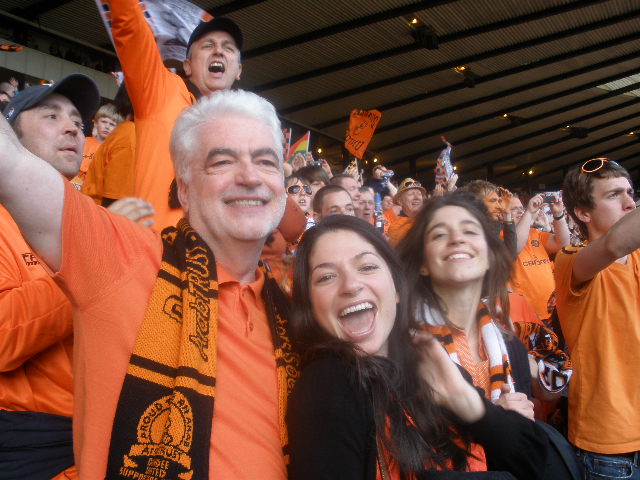 Billy, Catriona and Joanna celebrated United's Cup win at Hampden, May 2010
Billy, Catriona and Joanna celebrated United's Cup win at Hampden, May 2010
Dundee United are my home team - away across the Firth of Tay I can see their stadium Tannadice shimmering like a beacon from my office window as I write this. However, I grew up in Ayrshire as a Kilmarnock supporter and my father took me through to Tyncecastle when Killie won the league there in the last game of the season 1964/65. I started losing interest in club football around the age of 15 but continued going to the Scotland matches at Hampden right through university. During my time in Edinburgh, I never felt attacted to Hibs or Hearts and continued to feel alienated from club football in Scotland as it was so dominated by Rangers and Celtic with their unattractive sectarian traditions and support. It was only in the late 1970's when I was still living in Edinburgh that I began to take notice of the achievements of Jim McLean and the brand of attractive attacking football being played by Dundee United. The David v Goliath story always appealed to me! I started going to see them when they played in Edinburgh, and got so hooked that I began driving to their games all over the country and bought a season ticket for Tannadice that I have now held for over 30 years.
In that time I have seen them win the league at Dens, home of their city rivals Dundee FC, saw them relegated at Tannadice as the Celtic fans sang "We'll Meet Again", wittnessed a wonderful display of football supporters at their best as the United fans cheered FC Gothenburg who had beaten us in the UEFA Cup Final, travelled to Lens in France with the Edinburgh Arabs supporters bus, comforted the weans Euan and Catriona as we faced up to losing the play off against Partick and staying relegated for another year, and then experiencing abandoned wild elation as big Brian Welsh headed an equaliser deep in injury time and Owen Coyle won it for us in extra time. Character building stuff being a United supporter!
Then there were all of the cup final defeats and at long last two Scottish Cup final victories. When United first won the Scottish Cup in May 1994, Gwen McIlroy compiled and edited a book called Kissing Strangers whose profits went to the Leukemia ward of Ninewells Hospital. Here is an extract from my contribution: From Tales of Arabian Knights.
The Goal that Won the Cup.
The Arab head-dress under the sun was hoat, but as things were going fine, it could not be removed under any circumstance. Half time then sent this Arab to the oasis at the back of the stand to slake his thirst. The crush at the toilets however took up the full ten minutes, the queue for the drinks was still enormous and the second half had kicked off. Wi a throat like a camel wi the cauld, I headed back down to take up my position. I didn't get there. For, on my progress down, there occurred a strange and wonderful out-of-body experience in which I found myself taking off into the firmament - hovering in the air for many seconds with a feeling of ecstatic joy and landing among my tribe of celebrants two rows from the front. What caused it I shall never know. All I remember is Dailly running in on McPherson, Maxwell hitting the ball, Dailly recovering it and stroking it across the gaping maw of the goal...the frozen-in-time feeling when it hit the post and the tangerine blur that was Brewster blootering it into the back of the net. It was at that second that I soared and dived like a desert falcon. All praise to the Gods, Muslim, Christian, Ivan and Brewster.
You can see the Brewster goal on Youtube by clicking here:
http://www.youtube.com/watch?v=uJCmreBvqfE&feature=player_embedded
The second cup victory was just a wonderful day out, with Joanna coming home from Brussels for the occasion, Catriona set to fly down to Rio soon after to help the Homeless World Cup organise their competition on Copacabana beach, and Euan joining the Tangerine Army after a great first year at Edinburgh University. Ross County and their supporters added to the occasion too, as there was a great atmosphere that lacked the rancour associated with games against the bigger teams. Here are some photos from a memorable day.
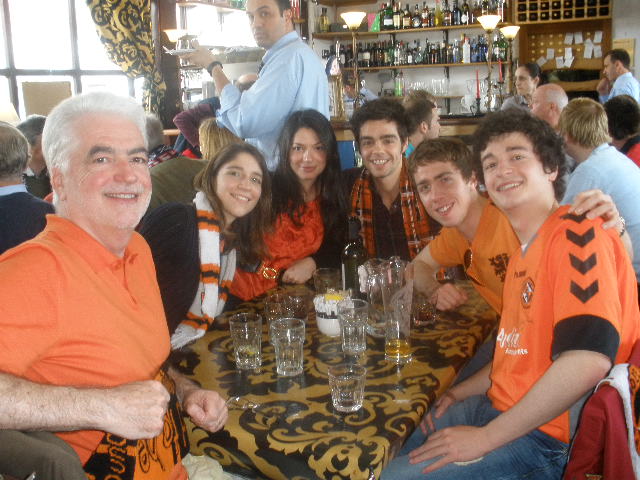 Having experienced many cup final defeats, United fans know to get the celebrations in early: Billy, Joanna, Catriona, family friends Elliott and Tom, and Euan in the Battlefield Rest restaurant before the match.
Having experienced many cup final defeats, United fans know to get the celebrations in early: Billy, Joanna, Catriona, family friends Elliott and Tom, and Euan in the Battlefield Rest restaurant before the match.
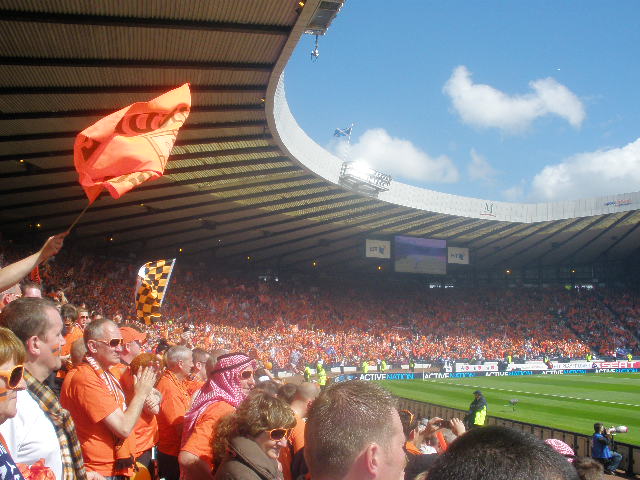 A wonderful sight - some of the 28,000 Arabs at Hampden before kick off
A wonderful sight - some of the 28,000 Arabs at Hampden before kick off
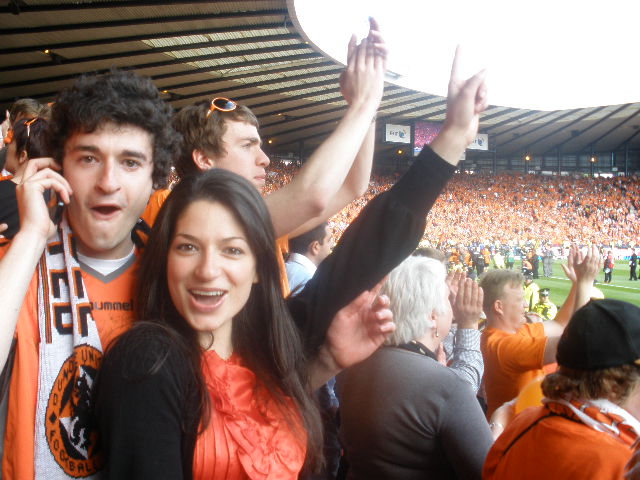 Dundee United 3 Ross County 0!
Dundee United 3 Ross County 0!
Finally, here is an article I wrote for The Scotsman newspaper when we were still living in Edinburgh. It describes the United supporters bus and our trip to France to play Racing Club Lens in September 1986 - the beginning of the campaign that would take us to the UEFA Cup Final.
"You're either on the bus or you're off the bus" wrote Hunter Thomson in Fear and Loathing on the Campaign Trail that epic celebration of the excesses indulged in by the American press corps following the Nixon - McGovern Presidential Election of 1972. The Press bus was an orgy of drugs, sex and gross behaviour; it was a Sunday school outing compared to many Scottish football supporters buses before alcohol was banned in the early 80's. The bears at play was not a pretty sight and my memory of football in the '60's is replete with images of buses awash with cans, every other lay-by full of men peeing on the way to the game and frequently throwing up on the way back.
Because of these memories I had never been tempted to try the bus that I frequently overtook on my solitary drive to see the team which had rekindled my latent interest in club football, Dundee United. With snow falling heavily in Edinburgh on the afternoon of a UEFA cup tie with Neuchatel Xamax of Switzerland and more forecast, however, I decided to eschew the suicide drive North and succumb to the ordeal of the bus. Nothing had prepared me for the shock of the new. Tony, the club secretary, fresh from the office in collar and tie and camel hair coat, welcomed me to the club as he presented copies of the weekly newsletter and club history - a short read as it had only been founded the year before. Also made welcome were a party of Swiss students, mainly girls, who were there to support Xamax. Alfie, an airline employee who uses Heathrow as a convenient base for following United all over Europe and I practiced our French out on them, while the boys at the back of the bus, tongue in cheek, chanted to the tune of Guantanamera, "Yodel when ye're winnin, ye'ze only yodel when ye're winnin, yodel when ye're wi-nnin, ye'ze only yodel when ye're winnin." There were sweepstakes, raffles, player of the month votes, crisps and lemonade for sale, labourers and businnessmen, punks and families, schoolkids and pensioners all contributing to the fevered atmosphere of anticipation that precedes a big game. If a few jugglers had appeared to entertain us on the Forth Road Bridge, I would'nt have blinked an eyelid. In the snow swept howes of Fife, the bus would suddenly leave the motorway, and approach clusters of black and tangerine dots standing fooneran at roundabouts. Craws wi big beaks? Naw, United fans fae Halbeath. On the bus were folk from Fife, Stenhousemuir, Linlithgow, Jedburgh, Dalkeith, Bonnyrigg, Dunbar and Edinburgh - few of them having any connection with Dundee but their love of the way Jim McLean has United playing football. Their enthusiasm was infectious and the journey seemed to fly past. From that moment on, I was definitely on the bus.
Since then, the civilised order of the bus has never failed to astonish me; a whip round for flowers for the United secretary who could'nt make the Player of the Year Dance because of illness in the family; framed photographs of the fans and their heroes available for sale on the bus three days after the player of the year dance; phone calls from Jim McLean himself on the morning of matches threatened by the weather, telling us whether to set out. A section of the bus catering for nursing mothers or vegetarians would not be totally out of place!
Part of the success of the Edinburgh and Lothians Branch of the Dundee United Supporters Club - whose membership has risen from 50 to 150 in a year - lies in the close relationship between the supporters club and United, an intimacy that would be impossible to achieve with, say, the big Glasgow clubs. Apart from admiring United's successful challenge to the old moneyed monopoly of Scottish football, my interest in the team was also tied in with my researches for the Odyssey programme which formed the basis of my play about Dundee's jute workers "They Fairly Mak Ye Work". The heroine of the play is based on a marvellous 85 year old "rebel" called Sarah Craig. Sarah's family are all United daft, and it is amazing the number of anecdotes I picked up about Sarah's life at places like Love Street and Tynecastle. I use football very much as an escape from the lonely existence of the writer, the fellowship of the bus and the tribal passions of the terracing very much an antidote to the word processor! This fan with floppy disk however was more than a little chuffed recently when the two worlds came together at Dundee Rep; Paul Sturrock, Eamonn Bannon, Davie Narey, Ralph Milne and Stewart Beedie all came along with their wives to lend their support to my work and see both the real Sarah Craig and Caroline Paterson's brilliant portrayal of her on stage. Several bus members also took in the play after matches at Tannadice, and some of the Dundee exiles were not slow in telling me where I got things right or wrong!
The fact that our bus is thrang with playgoing aesthetes, however is not widely known, least of all in Zola's mining district in the north of France, where "les flics" are probably waiting on us with the truncheons and watercannons which are de rigeur for fans from our sister nation to the South. The club has prepared a special banner just for the match, explaining that we are "fans ecossais" and not "vandales anglais" but the question is will they read the text before wading in to us?
As the buses roll South on Tuesday evening we are aware that something is different from the usual Saturday excursions; there are no supporters buses from other teams overtaking us and exchanging fraternal signs of recognition! Normally hostile fingers are raised in the overtaking bus whose fear and loathing is increased dramatically when we wave, smile, and occasiionally blow kisses back accross the motorway. After United's astonishing comeback to win 3-2 at Ibrox last month, the journey home was enlivened with hilarious encounters with confused Celtic fans. The sight of United's tangerine colours initiated the normal obscene jerking of arms and fists but many were caught frozen in mid gesture and internal turmoil as they debated the dilemna of whether any team that had just sickened the Gers could be anything but their friends. The dilemna was resolved with mutual rounds of applause echoing accross the M8.
Videos of United victories, and United victories only, helped the early part of the trip to Dover pass quickly but even reruns of Fawlty Towers or Blazing Saddles can appear like a form of Chinese torture when forced to watch at 4 in the morning through eyes that you know will not see sleep for another 24 hours. The many children on the bus slept soundly while fathers tried to kid on they were enjoying themselves - and they were only "daein it for the bairns". Having corresponded with the Ferry authorities for a month, sending character references and gaurantees galore, there was no problem crossing the channel, though French ferries had already stated that they would not carry us. The car vast empty park ofthe hyper market at Calais is'nt exactly Tannadice, but at 7.30 a.m. bleary eyed immitations of Narey and Luggy were chasing the ba' in an impromptu game of 30 a side fuitba. The locals were astonished. The visit to the hyper market over, the accordeon came out and Flower of Scotland, The Terrors of Tannadice, and The Road and the Miles to Dundee got big licks, while at the backof the bus some of the boys changed into their match outfits which committed various forms of sacrilege to the National Dress! Some of the hypermarket drink was consumed and the atmosphere was getting steeran. Unfortunately, drink is not banned on buses in France, so ironically while the teenagers drank in moderation, one or two of the auld anes lapsed into their old ways. The combination of drink and sleeplessness is deadly, and one or two were lucky to wake up in time for the match.
The people of Lens were attracted to the Scottish fans as the piper led them through the town centre at lunch time. Their fear of "des hooligans anglais" was won over in the restaurants and streets, as they realised that they were simply there to support the team and enjoy a day in their town. A mining area with most of the pits gone, high unemployment and many of its people forced exiles to other parts of France, the Lens folk had more in common with their visitors than a love of football. The only major communication problem concerned one Dundonian lad who kept asking for "twa beers" and kept being given three. The waittress decided the boy's French wasnae bad, just a pity about the speech defect which had him pronouncing trois as twa! As the opposing fans entertained each other in the cafe with their respective songs, outside, olive armoured carriers glided past thrang with riot police drafted in for the game. With, again no proper segregation of the fans inside the stadium, they stood grimly on stand by for trouble which was extremely unlikely to happen with these sets of fans. Instead, the terrace were like a medieval fair, with our fans swapping or giving away bonnets, scarves, flags and addresses while our valiant piper skirled away in the background. Our team too got in on the generosity act. As is their wont this season they gifted the first half to the opposition, then inevitably showed them who is actually the better team in the second half. Hopefully, by the return match United will be United for 90 minutes, and ease their way into the next round. The boys waved and applauded us as they left the pitch, and we all wished we were on their charter, instead of facing another long night's journey into day. Sleep finally overcame most of us, however and by the time we won home to Edinburgh at 2 on Thursday afternoon, we only felt three quarters dead. The revival will be complete by Saturday, and Douglas Park, Hamilton will be a nice wee jaunt in comparison. I mean, ye're either on the bus, or ye're aff yer heid!!

